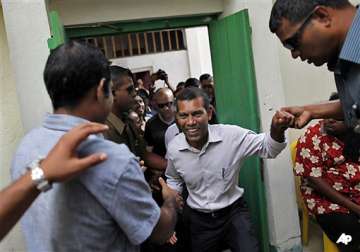India Asks Maldives To Resolve 'Complex' Situation Peacefully
Male, Feb 11: Making it clear that it will not intervene but “engage”, India today asked ousted Maldivian President Mohammed Nasheed and his successor Mohamed Waheed Hassan to resolve the “complex” situation in the country

Male, Feb 11: Making it clear that it will not intervene but “engage”, India today asked ousted Maldivian President Mohammed Nasheed and his successor Mohamed Waheed Hassan to resolve the “complex” situation in the country peacefully and democratically.
Concerned over the political crisis in this picturesque archipelago following 44-year-old Nasheed's resignation on Tuesday, India, which dispatched a special envoy to the country yesterday, said it was for Maldivians to take charge of the situation.
“The situation is of course complex. We would like to see it resolved in an atmosphere of calm and peace so that it does not affect the common man in Maldives,” M Ganapathi, Secretary (West) in the External Affairs Ministry, told a press conference here before leaving for New Delhi.
He stressed, “There is no countenancing of any intervention at all. It is engagement. It is for Maldivians to take charge.”
Ganapathi said the purpose of his visit was to meet the widest possible cross-section of stakeholders in Maldives.
Referring to Prime Minister Manmohan Singh's letter to Hassan, he said it was for “Maldivians themselves to resolve (their internal issues) peacefully and democratically within the framework of the Constitution of Maldives.”
Basides Nasheed and Hassan, Ganapathi met several political leaders here as well as the Chief Justice of Maldives' Supreme Court. He is also said to have met Mohamed Jameel, Maldives' new Home Minister.
Ganapathi said his discussions were “very friendly” during which he conveyed the elements of the message that the Prime Minister had mentioned in his letter.
All appreciated the position of India, which expressed it continued support for the requirements of Maldives, he said.
Replying to a query on Nasheed seeking India's intervention, Ganapathi said, “... this is an internal development in Maldives which should be resolved peacefully and democratically by the people of Maldives and within the framework of the Constitution.”
Asked if India had lost out by not backing Nasheed, he said, “I think this is not a cricket match. I think this a serious issue...I think we remain continuously engaged with President Nasheed and his team.”
Ganapathi said Indian High Commissioner Dnyaneshwar Mule has been talking to everyone.
“And India's engagement has been appreciated in my meetings with President Nasheed and other political leaders including President Waheed,” he said.
Asked if India supports early elections as sought by Nasheed, he said, “I think it has to be determined by the political leadership here. And we will go with political leadership's decision and as stipulated in the Constitution of Republic of Maldives.”
The current regime has said the elections would be held as per schedule in 2013.
On the recognition of the new regime, Ganapathi said, “I did convey to the leaders here including President Nasheed that Indian position is that India recognises States. That has been our consistent policy.”
Asked if Indian investments in Maldives are safe, especially the multi-million dollar airport project of GMR, Ganapathi said he had been assured on this front by the leaders here.
“I would like to reiterate that over the last three days, there has been no such statement of that nature. We have been assured that nothing will be done to affect foreign investments, including Indian investments in this country,” he said.